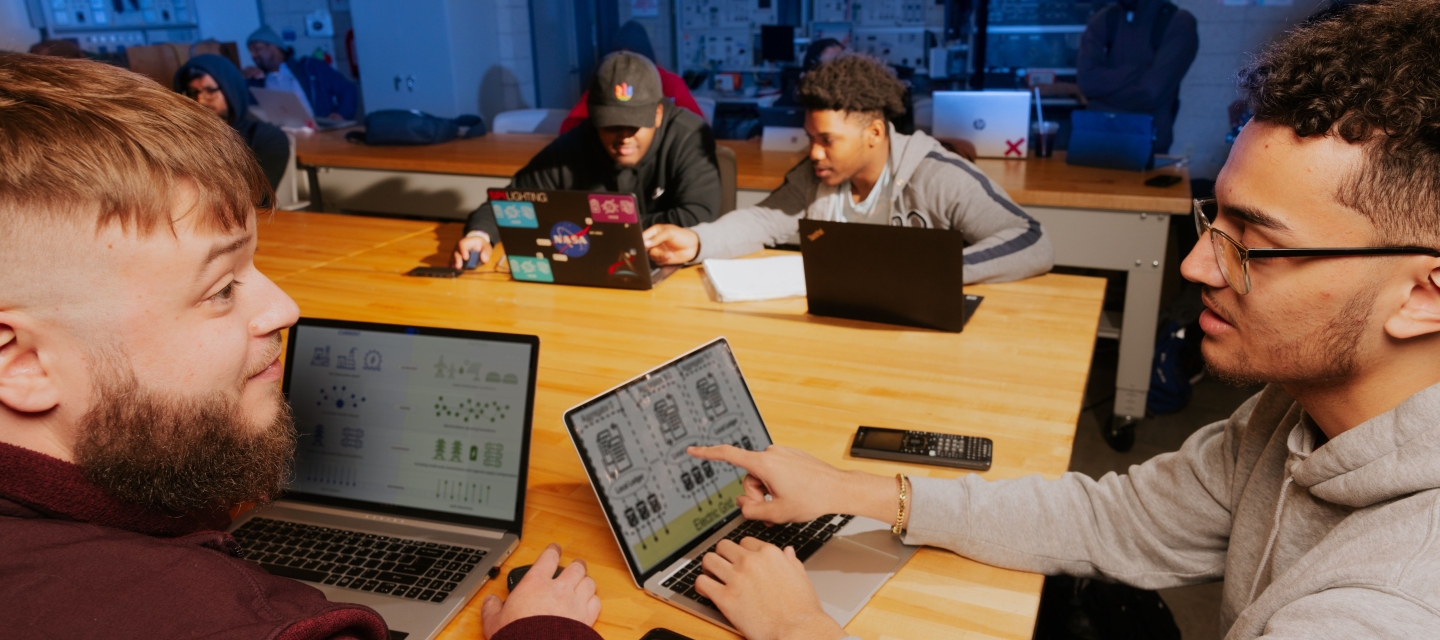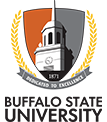
About
A Professional Lab is a project where a group of students will work together to find creative solutions for a concern from a business. These projects will allow students to build their portfolio while working in an academic setting.
Projects
Click on the name to jump to the description
Current Projects
- ACP Digital Equity Analysis
- DSA Student Micro Database and Dashboard
- TEU Database and Dashboard
- Open Data Boot Camp
- Rich Products - Census data
Previous projects
ACP Digital Equity Analysis
Buffalo State Mentor: Wende Mix
Contact: Heidi Zimmer
Project overview: The Affordable Connectivity Program (ACP) has been implemented by the federal government to address digital equity in the U.S. The goal of this project is to develop a prediction model for New York State. Tasks include:
- Review information about the ACP – especially criteria for eligibility.
- Review Dr. Horrigan’s article.
- Collaborate with teammates and mentor on data and model options.
- Develop and test/verify model.
- Prepare report.
DSA Student Micro Database and Dashboard
Buffalo State Mentor: Dr. Joaquin Carbonara
Project Overview: This is a professional lab that is designed to retrieve, store, and utilize student data for the DSA program. The goal of this lab is to create a micro database with data of all the students. The goal of this lab is to learn how to apply database knowledge in a real-life setting. You will build a web application that will create a student survey and connect it straight to a database. Then, the web application should be able to edit and create tools to dynamically add more information into the survey by both students and administrators. This web app should also be set up in a way that the data can be used to create basic or complex visualization. We will also learn about modular programming that will allow more features to be added in the future. We will be using python, javascript, mysql, and HTML to build this software. This lab is looking for 2 to 3 people that have a good handle on python and design.
In this professional lab you will be responsible for creating a dashboard which displays data about the DSA program for prospective students. These dashboards should create dynamic visualizations that showcase the skills that students will gain through their classes while providing information about the DSA program. The goal of this lab is to learn how to apply database knowledge in a real-life setting.
TEU Database and Dashboard
Buffalo State Mentor: Dr. Joaquin Carbonara
Contact: Tiffany Fuzak
Project Overview: This professional lab aims to create a database, as well as the operational mechanisms, to centralize and standardize the collection of data from multiple, small data sources. This database will house information for the TEU program completers and assessment data related to currently enrolled students. The operational mechanisms must include the cleaning, querying and manipulation of data in various formats such as csv, xml, html, dat, and txt, using SQL and Python. The database will be used to supply data for a TEU Dashboard, regular data shares, and regulatory reporting. Participants will learn to effectively communicate with stakeholders, colleagues, and superiors, and create practical documentation for future users of the database.
Open Data Boot Camp - Buffalo Public Library
Buffalo State Mentor: Dr. Wende Mix
Project Overview: Work with 1 or 2 library staff to complete a project of their choosing using open data sources.
Rich Products - Census data
Buffalo State Mentor: Dr. Wende Mix
External Contact: Catherine March
Project Overview: Examine the US Census data recently released and how it relates to where Rich’s sells/distributes/manufactures product. As census demographics change our ability to produce product in certain regions can be affected (labor shortages for example), and where we sell product also changes. We would be looking for a deep dive into some of the data available from the US Census (demographic, age, economic, race/ethnicity) to understand how our current manufacturing and sales profiles match or do not match the US population (And what we should plan for in our future network designs).
Previous Projects
Amherst Senior Transportation Services
Buffalo State Mentor: Dr. Wende Mix
External Contact: Mike Gibbons
http://www.amherstvans.org/index.html
Project Overview: Create a dashboard for the non-profit Amherst Senior Transportation Services (ASTS). ASTS is a non-profit that provides transportations services to Amherst residents who are 55 or older to the grocery store, medical appointments, and the senior center. The goal of this professional lab would be to create database for this company to track rides, participants, donations, etc.
Fall 2020- Phase 1 was to develop a database and software in python to make reservations for ASTS services. The second phase is modifying the application and adding tasks, such as generating weekly , monthly, and annual reports.
Eclipse
Buffalo State Mentor: Dr. Joaquin Carbonara
Contact: Al DelMerico
Project Overview: This internship/PL is funded by a NYSERDA grant. Students will support senior personnel from ICHIP and Erie county in the implementation of an energy savings program for low and middle-income families. Data will be collected and analyzed to determine impact and benefits.
Marketing Analytics- Millington-Lockwood
Buffalo State Mentor: Dr. Joaquin Carbonara
Contact: Melissa Brinson
Project Overview: The goal of this professional lab is to process the company’s marketing data (Google Analytics) to optimize the company’s ability to track and understand their data.
Rich Products- Cluster Analysis and Forecasting
Buffalo State Mentor: Dr. Joaquin Carbonara
Contact: Catherine March
Project Overview: Rich Products is a global food manufacturing and distribution company, producing products ranging from pizza and donuts, to mozzarella cheese sticks and ice cream cakes, and everything in between. In the US and Canada, they operate 22+ plants and ship product to customers ranging like national or regional grocery stores, convenience/gas stations, schools/universities, restaurants, and cafeterias. They forecast this demand based on several factors: previous ordering patterns, known customer promotions, new product development projections, and seasonality. The Network Modeling team uses that forecast to run modeling scenarios on how best to produce and distribute product across the network, including adding or consolidating plants or warehouses. Using a range of forecasts will allow the modeling team to stress test various scenarios against potential forecast results, which is a gap this project will fill.
Using clustering analysis and forecasting methods, the purpose of this project will be to create ranges of forecasts based on customer similarities. For example, if Customer 1 buys 10 products and Customer 2 buys 7 of the same products, what’s the impact of Customer 2 adding the final 3 products? Conversely, what is the impact of Customer 1 deciding not to buy the 3 products that Customer 2 doesn’t also buy? Then creating these ranges of forecasts the Network Modeling team can stress test different scenarios against various forecast targets.
Data Analytics to Inform a Multiple Measures Assessment and Placement Policy
Buffalo State Mentor: Dr. Joaquin Carbonara
Contact: Heather Maldonado
Project Overview: The objective of this project is to use data analytics to inform the development of a multiple measures assessment and placement policy. The project will investigate the use of historical high school Grade Point Average (GPA) and earned college math and writing grades to identify thresholds that will enable professional advisors to place students in gateway math and writing courses that maximize student success outcomes.
School-Zone Speed Study
Buffalo State Mentor: Dr. Joaquin Carbonara
Contact: Peter Rizzo
Projecy Overview: In August 2019, the City of Buffalo announced that it would install speed enforcement cameras in 20 school zones under an effort called the “School Zone Safety Program.” Since then, City officials have maintained that this program has one purpose: “To reduce school zone vehicle crashes” in the name of child safety. The speed cameras use radar and photo technology to identify and document vehicles traveling above the City’s 15-mile-per-hour school zone speed limit.
The goal of this project is to explore the social equity of the school speed-zone camera program.
Are all segments of the population equitably impacted by this program?
Are negative consequences of this program disproportionately impacting specific segments of the population?
Students in the professional lab will attempt to answer these questions using data analysis techniques.
Zombie Houses
Buffalo State Mentor: Dr. Joaquin Carbonara
Contact: Joe Trapp
Project Overview: In this professional lab students will be working with Third Estate Analytics, a company which provides deeper analytics data mining to produce positive change in neighborhoods' housing conditions. Students will leverage publicly available data to do the work. Students at different levels of expertise can join this project and learn from the activities and mentoring.

